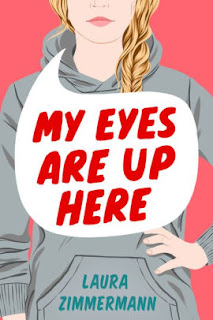Now that they are in middle school, Elizabeth worries that her best friend Maddie is drifting apart from her. Maddie no longer seems to enjoy
Dr. Who marathons and is always hanging out with snooty Stephanie instead of her. And even though they signed up for cooking class together, Maddie just sits around and makes fun of the teacher Mrs. Hameed, her spicy cooking, and her Pakistani funny accent. However, Elizabeth has to agree with Maddie that the teacher's daughter, Sara (who just transferred in this year) really
is weird.
Sara, meanwhile, isn't thrilled to be dragged to her mother's new job teaching cooking. Being shown off isn't going to help her fit in or make new friends. In any case, she gets more than her fill of cooking at home, where her mother runs a catering business out of their kitchen. The kids are rude and disrespectful. She'd rather be working on her drawing.
So, when the two girls end up getting paired together in the class, they aren't thrilled. Yet, as they get to know each other, they find that they have a lot in common. Elizabeth's mother is English and, like Sara's mother, studying for her citizenship test. Both mothers are struggling, a fact of which both daughters are aware. Elizabeth's grandmother has recently died and her mother struggles with depression. Sara's mother is trying to keep the catering business afloat. Racism and xenophobia are a big factor for Sara's family, but Elizabeth's mother faces discrimination as a foreigner and as a converted Jew. Both girl's deal with the sense of belonging in two different worlds: the homeland and their home.
What brings everyone together in the end is food and a love for cooking. The cooking class and an international food fair at the end of the story serve as a catalyst for exploring differences and similarities. And while the writing can get heavy handed and the premise sounds saccharine, it is deftly handled. If nothing else, reading will give you serious craving for a curry!
There's some obligatory effort made to explore xenophobia and racism. That's probably the clunkiest part of the story, as Elizabeth's friend Maddie says some pretty extreme things that get quickly shut down by both adults and children in a bit of wishful thinking. Far more effective is the portrayal of the Home Ec teacher's prejudice and micro aggressions from children and teachers that Sara and Elizabeth call out.
I enjoyed the descriptions of the cooking of course, but also the way that the girls got to talk about their mixed feelings about their heritage in an unforced way. Given the title, the obvious focus is about how everyone will come together in the end and they do, marveling over the differences and similarities in world cuisine and people. The symbolism of the fusion dish that the two girl's concoct cements this message.




















